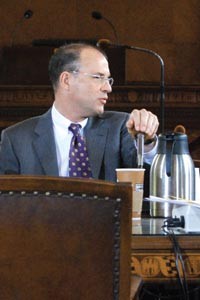When officials from the University of Pittsburgh Medical Center (UPMC) announced in June that South Side Hospital would soon close, their decision seemed final.
At a town-hall meeting with UPMC officials last summer, recalls state Rep. Harry Readshaw (D-Carrick), "I stood up and asked, 'Is there any way that we can stop or alter this process?' And the response was: 'No.'"
Now, however, the answer seems more like "maybe."
That's the impression elected officials were left with after a Dec. 8 meeting with UPMC's CEO, Jeffrey Romoff.
"The meeting was very, very positive," says City Councilor Bruce Kraus, who along with Readshaw and Sen. Jay Costa (D) met with Romoff for 90 minutes. "I left thinking it wasn't a 100 percent decision to close the hospital completely."
The meeting didn't reveal UPMC's ultimate plans for the hospital, but Readshaw says UPMC officials have pledged to meet with the community in the future. The first community meeting is scheduled for 7 p.m., Jan. 14, at the South Side Market House.
Located at 20th and Mary streets, South Side Hospital was purchased by UPMC in 1996. The facility employs more than 700 people and offers a variety of services, including emergency care, orthopedics and outpatient diagnostics.
But earlier this year, UPMC announced that in July 2009, South Side Hospital would begin transferring its services to Uptown's UPMC Mercy, which UPMC acquired a year ago and which is undergoing a $75-90 million expansion.
Since UPMC officials initially announced their plans, residents and elected officials have embarked on letter-writing campaigns. And UPMC has started changing its tune. Although UPMC officials say inpatient services, like rehabilitation beds, can't remain in the South Side, they're willing to consider leaving in place physicians' offices and other outpatient services.
"There appears to be room for discussion," says Kraus, who delivered Romoff nearly 600 letters from residents, businesses and community groups, begging UPMC not to shutter the hospital. "I'm very pleased with where we are in the [negotiating] process."
UPMC appears more willing to talk with reporters as well.
In October, a UPMC spokesperson declined to answer questions from CP, instead issuing a short statement saying that the merger was "the m[o]st prudent use of [UPMC's] resources." But now, UPMC officials are answering questions.
"We are moving inpatient services to UPMC Mercy," says UPMC spokesperson Paul Wood. But, he adds, "We plan to maintain ... outpatient services on the South Side for as long as patient demand can support" them.
Kraus says Romoff told him the reason for relocating hospital beds is simple: On average, Kraus says Romoff explained, only 30 percent of UPMC South Side's beds were being used.
Readshaw says he understands the problem that poses for UPMC. What he doesn't understand, he says, is why UPMC was so slow to explain its reasoning.
"Prior to the closing [announcement], I wasn't aware of that facility being underutilized," he says. "It would have been nice to know the stats prior to [UPMC] making the decision to close."
An equally interesting question, Readshaw adds, is "why [UPMC] might have mellowed a bit."
Could it be a PR move? "If they were dancing, I don't think we would have gotten that high up on the food chain," says Readshaw, referring to his meeting with Romoff.
Readshaw's theory -- and Kraus' too -- is that the economic slowdown may have something to do with it.
Wood says UPMC's merger decision is "absolutely not" financial, but Kraus maintains, "The finances of the world have changed considerably since [the] decision [to close UPMC South Side] was made."
"They might have had the money when they made the decision," Readshaw surmises, "but do they have the money now?"
In any case, Rick Belloli, executive director of the South Side Local Development Company, says he's "cautiously optimistic" that the hospital's prognosis looks brighter than it once did.
To help facilitate negotiations, Belloli says the South Side planning forum recently created a three-member steering committee, made up of neighborhood residents and business owners, whose purpose is to "establish direct dialogue with UPMC." Belloli says the committee's first priority is to keep the hospital open in some form, but committee members will look into alternative uses for the facility if that effort fails.
"It's great that there is some willingness by UPMC to assess the functional components of the hospital," he says. "I think we can work together to maximize the health-care delivery to the neighborhood and make sure it's financially viable for UPMC. There is always middle ground."















